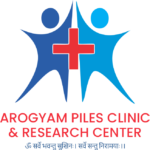Irritable Bowel Syndrome (IBS) and piles are two common gastrointestinal conditions that can significantly impact a person’s quality of life. While they are distinct conditions, there is emerging evidence suggesting a potential link between IBS and the development of piles. In this blog, we will explore the relationship between IBS and piles, drawing insights from Arogyam Piles Clinic and Research Center in Mohali, Chandigarh.
Understanding Irritable Bowel Syndrome (IBS):
IBS is a chronic disorder characterized by abdominal pain or discomfort, bloating, and altered bowel habits without any identifiable structural or biochemical abnormalities. It affects the large intestine and can manifest as diarrhea-predominant (IBS-D), constipation-predominant (IBS-C), or a mixed pattern (IBS-M).
The Link between IBS and Piles:
Research has shown that individuals with IBS have a higher prevalence of hemorrhoids, commonly known as piles. Hemorrhoids are swollen blood vessels in the rectum or anus, which can cause pain, itching, bleeding, and discomfort during bowel movements. While the exact mechanism behind this association is not fully understood, several factors contribute to the development of piles in individuals with IBS:
- Constipation: IBS-C subtype, characterized by infrequent and hard stools, can lead to increased straining during bowel movements. This prolonged straining puts pressure on the blood vessels, leading to the development of hemorrhoids.
- Diarrhea: IBS-D subtype, characterized by frequent loose stools, can also contribute to the development of piles. Chronic diarrhea can cause irritation and inflammation of the anal area, making it more susceptible to hemorrhoids.
- Pelvic Floor Dysfunction: Some individuals with IBS may also experience pelvic floor dysfunction, which can involve abnormalities in the muscles, nerves, and connective tissues in the pelvic area. This dysfunction can impair the normal functioning of the anal sphincter, leading to increased pressure on the blood vessels and the development of hemorrhoids.
Insights from Arogyam Piles Clinic and Research Center:
Arogyam Piles Clinic and Research Center in Mohali, Chandigarh, specializes in the diagnosis, treatment, and management of piles. They have observed a significant correlation between IBS and piles in their clinical practice. Through their extensive experience, they provide valuable insights into the relationship between these two conditions:
- Comprehensive Evaluation: At Arogyam Piles Clinic and Research Center, patients with IBS and piles are thoroughly evaluated to understand the severity and specific symptoms of both conditions. This holistic approach helps in developing a personalized treatment plan.
- Lifestyle Modifications: Lifestyle modifications play a crucial role in managing both IBS and piles. Arogyam Piles Clinic emphasizes the importance of a high-fiber diet, regular exercise, and adequate hydration to regulate bowel movements and prevent constipation or diarrhea.
- Medications and Procedures: Depending on the severity of symptoms, Arogyam Piles Clinic offers a range of treatment options for piles, including medications, minimally invasive procedures, and surgical interventions. The choice of treatment is tailored to the individual patient’s needs and preferences.
- Patient Education and Support: Arogyam Piles Clinic provides comprehensive patient education to raise awareness about IBS, piles, and their interrelationship. They offer guidance on self-care practices, stress management techniques, and preventive measures to minimize the risk of complications.
Conclusion:
The association between IBS and piles highlights the importance of a multidisciplinary approach in managing these conditions. Arogyam Piles Clinic and Research Center in Mohali, Chandigarh, offers valuable insights into the relationship between IBS and piles, emphasizing the need for comprehensive evaluation, lifestyle modifications, and personalized treatment plans. By addressing the underlying factors contributing to both conditions, individuals can find relief and improve their overall gastrointestinal health.



